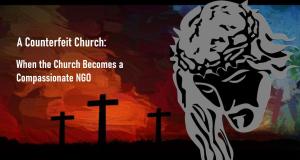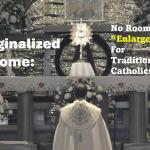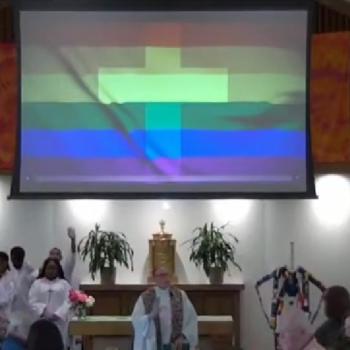During his first homily as Pope in 2013, Pope Francis gave the following warning:
…if we do not confess Jesus Christ, nothing will avail. We will become a compassionate NGO [non-government organization], but not the Church, the Bride of Christ.
When we walk without the Cross, when we build without the Cross, and when we profess Christ without the Cross, we are not disciples of the Lord. We are worldly, we are bishops, priests, cardinals, Popes, but not disciples of the Lord.
Amen, Holy Father!
The temptation to remake the Church into a compassionate NGC (CNGO) manifest most when some within the Church seek to replace Christ’s call for personal holiness with a more humanist call for “social justice.” This humanistic call rejects Christ and turns the Church into a hospital devoid of proper medicine and the Good Doctor required to heal the sick within.
Therefore, we need to understand Christ’s call for holiness, identify the attempts of those within the Church to lead us away from this call (and thus create an CNGO), and how to understand true social justice in the light of Christ.
Christ’s Call to Holiness
If you love me… keep my commandments. (John 14:15)
Whoever has my commandments and keeps them… (John 14:21)
“Not everyone… will enter the kingdom of heaven, but the one who does the will of my Father who is in heaven. (Matthew 7:21)
You therefore must be perfect, as your heavenly Father is perfect. (Matthew 5:48)
“You shall be holy, for I am holy.” (1 Peter 1:14-16) and (Leviticus 11:45)
Go, and from now on sin no more (John 8:11)
Enabled by the God’s grace, Christ calls all Christians to holiness and away from sin. Additionally, Jesus provided the means to achieve holiness and flee sin through His death and resurrection. As ransomed by Christ’s precious blood (1 Peter 1:19), Christians, in gratitude for such a gift, ought to respond in true conversion by fleeing sin and living a life marked by holiness and grace. St. Paul, in his letter to the Galatians (Galatians 5:19-26), provides key insights into a life in pursuit of holiness, both positively (in the Spirit) and negatively (in the flesh).
To lessen or de-emphasize Christ’s call to holiness equates to the denial of Christ Himself. In turn, this denial robs the Church of its full Gospel message and creates a counterfeit Church or CNGO.
A Holy Catholic Life
Moreover, a holy Catholic life is one devoted to the pursuit of Christ, not merely the avoidance of evil and the doing of good. In Lumen Gentium (LG) 40, we read:
…all the faithful of Christ of whatever rank or status, are called to the fullness of the Christian life and to the perfection of charity; by this holiness as such a more human manner of living is promoted in this earthly society…They must follow in His footsteps and conform themselves to His image seeking the will of the Father in all things. [emphasis added]
Holiness, as the pursuit of Christ, is a life-long process. Thus, all Catholics stumble and fall along the way, a way the Catechism states “passes by way of the Cross.” For those that fall, Christ provided a way of reconciliation with God and the Church through the sacrament of Penance (or Reconciliation). In this sacrament, the contrite penitent recognizes his/her sin and seeks God’s forgiveness through His ministers of reconciliation (priests and bishops).
Furthermore, the holy life finds its nourishment in the Holy Eucharist. The Catechism beautifully states:
As bodily nourishment restores lost strength, so the Eucharist strengthens our charity, which tends to be weakened in daily life; and this living charity wipes away venial sins. By giving himself to us Christ revives our love and enables us to break our disordered attachments to creatures and root ourselves in him…
Again, any who attempt to lessen or de-emphasize the “way of the Cross,” by denying the reality of sin and God’s power to forgiven and restore the sinner, promotes a counterfeit Church or CNGO. They also place souls in danger of profaning the body and blood of Christ by partaking of the Eucharist in an unworthy manner.
Marks of a Holy Church
One, Holy, Catholic, and Apostolic. These are attributes of the true Church established by Christ. One mark of the true Church resides in her ability to produce holy people. In Solmni Hac Liturgia, St. Pope Paul VI observes:
She is therefore holy, though she has sinners in her bosom, because she herself has no other life but that of grace: it is by living by her life that her members are sanctified; it is by removing themselves from her life that they fall into sins and disorders that prevent the radiation of her sanctity. This is why she suffers and does penance for these offenses, of which she has the power to heal her children through the blood of Christ and the gift of the Holy Spirit.
To reiterate, a holy Church produces holy people. When those within her remove themselves from her life (see above), they fall into sins and disorders. These sins and disorders cause critics to question the holiness of the Church herself. To such critics, the Church becomes a mere human institution, the CNGO Pope Francis warned about.
Marks of a Counterfeit Church or CNGO
Conversely, the counterfeit Church or CNGO marks itself by a de-emphasis on holiness and an overemphasis on worldliness. The Church as CNGO does not profess the true Christ, but a false worldly Christ. This Christ discounts the effects of sin, or, in the name of indiscriminate “love,” morally accepts everyone and demands nothing, especially genuine conversion (holiness). As an CNGO, the focus moves from holiness to “social justice.” One commits “sin” in an CNGO when they (or anyone) violate the tenants of “social justice.” For example:
- The dignity of the human person, but only as it relates to marginalized population.
- Emphasis on collectivism (poverty, social programs, and environmentalism).
- Victimhood narrative against patriarchy, systematic racism, and heteronormativity.
- Immutable human nature: the inability to change one’s “nature,” or sexual “identity,” once this said “identity” becomes identified.
- Reproductive justice: access to abortion.
Some popular “Catholic” organizations that appeal to this form of “social justice” for support include Catholics for Choice and New Ways Ministry. Sadly, these groups (and others like them) pervert valid Catholic teaching found in Catholic social justice and remake them into something anti-Catholic.
True Catholic Social Justice
The United States Conference of Catholic Bishop (USCCB) provides the faithful with resources concerning Catholic social justice. The USCCB lists seven themes of Catholic social justice:
- Life and Dignity of the Human Person
- Call to Family, Community, and Participation
- Rights and Responsibilities
- Option for the Poor and Vulnerable
- The Dignity of Work and the Rights of Workers
- Solidarity
- Care for God’s Creation
Word of Fire’s Dr. Matthew Petrusek May, 2023 article Rehabilitating Social Justice precisely explains true Catholic social justice as both the care of each human person, regardless of development or location, and the social responsibility of each individual Catholic. In his concluding paragraph, Dr. Petrusek makes the following observation regarding the instances when principles of Catholic social justice come into play:
In the end, the Catholic conception of social justice comes down to asking and answering two fundamental questions:
- Can we identify a policy that is causally contributing to (and not merely correlated with) an unjust impediment to the full, authentic flourishing of families, individuals, and communities?
- Is there a realistic possibility that a change to that policy (either by means of addition, revision, or deletion) could quantifiably remove or reduce the unjust impediment—without violating natural law or causing greater harm—and thereby support the full, authentic flourishing of families, individuals, and communities?
Therefore, the employment of Catholic social justice cannot in any way violate Catholic teaching and remain truly “just.” The moment an organization’s “social justice” violates Catholic teaching, it denies Christ and becomes part of a counterfeit Church or a mere CNGO.
Final Thoughts…
To conclude, according to the first paragraph of the Catechism, the purpose of all human life is to know God and live with Him forever.
God, infinitely perfect and blessed in himself, in a plan of sheer goodness freely created man to make him share in his own blessed life. For this reason, at every time and in every place, God draws close to man. He calls man to seek him, to know him, to love him with all his strength. He calls together all men, scattered and divided by sin, into the unity of his family, the Church. To accomplish this, when the fullness of time had come, God sent his Son as Redeemer and Savior. In his Son and through him, he invites men to become, in the Holy Spirit, his adopted children and thus heirs of his blessed life.
The key to becoming God’s “adopted children and thus heirs of his blessed life” is holiness. To seek holiness is to seek God, know God, and love God with all our strength. God make this “blessed life” possible through Christ Jesus. For, as Pope Francis warned during his first homily as Pope:
…if we do not confess Jesus Christ, nothing will avail. We will become a compassionate NGO, but not the Church, the Bride of Christ.
Amen!
Thank you!
Read The Latin Right’s other writing here.














